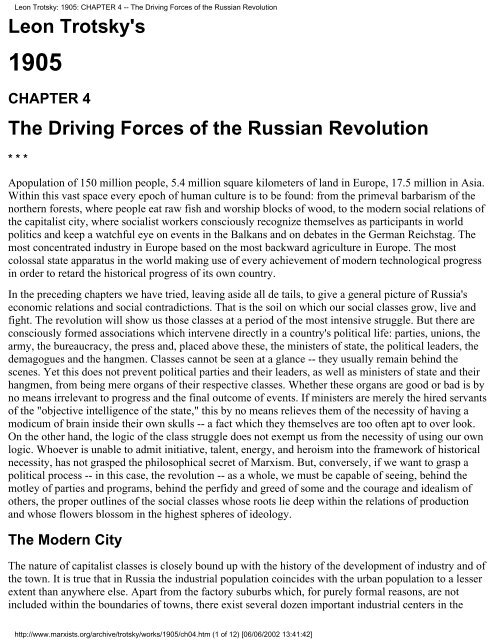Leon Trotsky: 1905
Leon Trotsky: 1905
Leon Trotsky: 1905
Create successful ePaper yourself
Turn your PDF publications into a flip-book with our unique Google optimized e-Paper software.
<strong>Leon</strong> <strong>Trotsky</strong>: <strong>1905</strong>: CHAPTER 4 -- The Driving Forces of the Russian Revolution<br />
<strong>Leon</strong> <strong>Trotsky</strong>'s<br />
<strong>1905</strong><br />
CHAPTER 4<br />
The Driving Forces of the Russian Revolution<br />
* * *<br />
Apopulation of 150 million people, 5.4 million square kilometers of land in Europe, 17.5 million in Asia.<br />
Within this vast space every epoch of human culture is to be found: from the primeval barbarism of the<br />
northern forests, where people eat raw fish and worship blocks of wood, to the modern social relations of<br />
the capitalist city, where socialist workers consciously recognize themselves as participants in world<br />
politics and keep a watchful eye on events in the Balkans and on debates in the German Reichstag. The<br />
most concentrated industry in Europe based on the most backward agriculture in Europe. The most<br />
colossal state apparatus in the world making use of every achievement of modern technological progress<br />
in order to retard the historical progress of its own country.<br />
In the preceding chapters we have tried, leaving aside all de tails, to give a general picture of Russia's<br />
economic relations and social contradictions. That is the soil on which our social classes grow, live and<br />
fight. The revolution will show us those classes at a period of the most intensive struggle. But there are<br />
consciously formed associations which intervene directly in a country's political life: parties, unions, the<br />
army, the bureaucracy, the press and, placed above these, the ministers of state, the political leaders, the<br />
demagogues and the hangmen. Classes cannot be seen at a glance -- they usually remain behind the<br />
scenes. Yet this does not prevent political parties and their leaders, as well as ministers of state and their<br />
hangmen, from being mere organs of their respective classes. Whether these organs are good or bad is by<br />
no means irrelevant to progress and the final outcome of events. If ministers are merely the hired servants<br />
of the "objective intelligence of the state," this by no means relieves them of the necessity of having a<br />
modicum of brain inside their own skulls -- a fact which they themselves are too often apt to over look.<br />
On the other hand, the logic of the class struggle does not exempt us from the necessity of using our own<br />
logic. Whoever is unable to admit initiative, talent, energy, and heroism into the framework of historical<br />
necessity, has not grasped the philosophical secret of Marxism. But, conversely, if we want to grasp a<br />
political process -- in this case, the revolution -- as a whole, we must be capable of seeing, behind the<br />
motley of parties and programs, behind the perfidy and greed of some and the courage and idealism of<br />
others, the proper outlines of the social classes whose roots lie deep within the relations of production<br />
and whose flowers blossom in the highest spheres of ideology.<br />
The Modern City<br />
The nature of capitalist classes is closely bound up with the history of the development of industry and of<br />
the town. It is true that in Russia the industrial population coincides with the urban population to a lesser<br />
extent than anywhere else. Apart from the factory suburbs which, for purely formal reasons, are not<br />
included within the boundaries of towns, there exist several dozen important industrial centers in the<br />
http://www.marxists.org/archive/trotsky/works/<strong>1905</strong>/ch04.htm (1 of 12) [06/06/2002 13:41:42]















![tyf Enf=O=n]lgg](https://img.yumpu.com/47584932/1/190x245/tyf-enfonlgg.jpg?quality=85)

